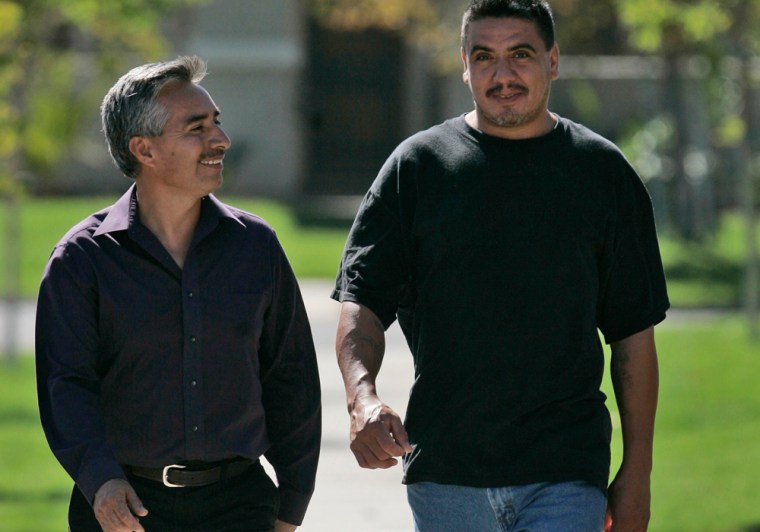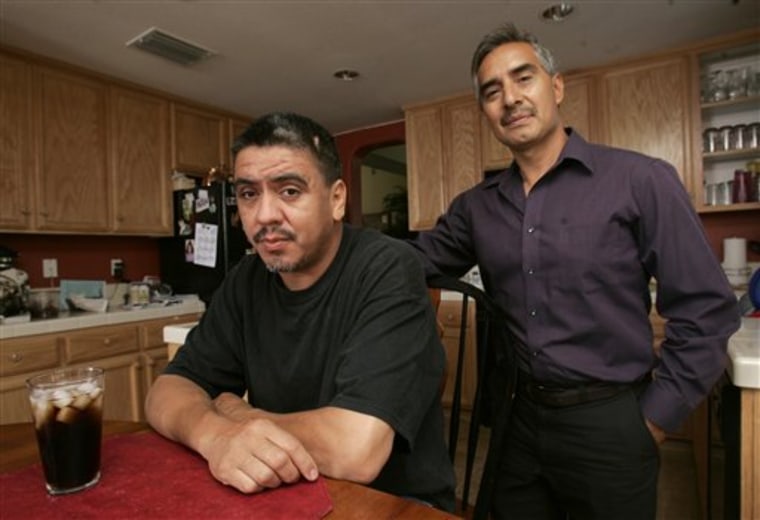Nahuel Castrucci had no lawyer when he went before an immigration judge the first time, or the second time. He sat speechless and handcuffed as the judge was about to expel him from his own country.
That's when his mother jumped up in the courtroom and shouted, "He's a citizen! He's a U.S. citizen! He shouldn't be here!"
She was right. Her outburst prompted the judge to ask for more investigation from lawyers, eventually leading to Castrucci's release.
The American judicial system deems everyone innocent until proven guilty and guarantees a fair hearing with a lawyer — but not when it comes to immigration. Then there are far fewer rights. And as the system comes under pressure from a flood of new cases, the strain is showing.
Odds are stacked against them
One result is that U.S. citizens arrested as illegal immigrants or deportable residents cannot count on the legal system as a safety net. The odds are stacked against them. On the basis of interviews, lawsuits and documents obtained through the Freedom of Information Act, The Associated Press has documented more than 55 such cases since 2000, and immigration lawyers count hundreds more.
Those who go through the immigration legal system can be arrested without a warrant. They are not read their rights unless it's a criminal case. They do not get a lawyer unless they can pay or find one who will work for free. They can be deported without hearings. And until this January, they didn't get a free phone call.
"They are deporting a very large number of people in very fast ways, often under the radar of any review by courts," said Daniel Kanstroom, director of the International Human Rights Program at the Boston College Law School. "Deportation of citizens is the tip of the iceberg. ... The system is in dramatic, desperate need of reform."
Jim Hayes, director of detention and removal for Immigration and Customs Enforcement, said his agency does not keep track of how many citizenship claims it receives, or how many turn out to be valid. He said it's more common for citizens to claim they are foreign-born to evade a criminal sentence than it is for citizens to be mistaken for immigrants.
"We don't make a habit of accidentally picking people up. It's not our desire to arrest U.S. citizens and take them into custody for immigration violations," Hayes said.
Still, he said, authorities need to be careful about determining citizenship.

"I think it's incumbent upon us to show due diligence and fully investigate and ensure this is, in fact, someone who is a U.S. citizen before we release this person to the public," Hayes said.
Immigration cases often complex
Castrucci is an example of how complex immigration cases can be, especially if they involve people who are born abroad and gain citizenship through U.S.-born or naturalized parents.
He was arrested more than two years ago, when armed officers burst into his bedroom in Chelsea, Mass., and accused him of being in a gang he said he had left two months earlier.
Castrucci, 22, who was born in Argentina, said he thought he was a citizen because his mother was and asked officers to check his Social Security number, but they didn't. Although there were no criminal charges, immigration officials kept him in custody.
In custody, he found Laura Murray Tjan, a lawyer with the Political Asylum/Immigration Representation Project, but Tjan did not attend his first two hearings because she said the case should have been clear to any immigration official.
It took a month before Castrucci's citizenship was verified and he was released.
"For me, it was a matter of making use of very limited resources (hundreds of detainees, one me)," Tjan said in an e-mail. "What I ultimately learned in these citizenship cases though was that ICE repeatedly missed what I perceived as really obvious issues...They know where his bedroom is, but don't know he's a U.S. citizen."
Tjan also noted she had four or five cases of U.S. citizens picked up for removal proceedings in a year, "and I'm only one person."
No access to documents
Rene Saldivar, 41, of Riverbank, Calif., gained citizenship through his father, who was born in Colorado. But he had no way of proving that to immigration officials because he was sent to a jail far from home and had no access to either lawyers or legal documents such as his birth certificate.
Saldivar speaks in short sentences, like a shy child, and his family says his mental functions are on the level of a teenager.
One day in October 2007, police pulled him over as he rode a bike just ahead of the car of his brother-in-law, Aquiles Rojas. Saldivar was arrested for failing to show up for probation visits related to possessing drug paraphernalia, and was held at a Grayson County jail for two months.
When Saldivar had completed his sentence, Rojas went to pick him up. But Saldivar wasn't there. A sheriff's deputy said immigration had him, but he didn't know where.
Rojas called immigration facilities in Sacramento, San Francisco and Eloy, Ariz., where he knew detainees were regularly sent. No luck.
For six months, the family did not know where Saldivar was. They went to Tijuana, Mexico, to look for him. Some feared he was dead. Rojas, a pastor at Samaritano in Modesto, Calif., said prayers for him.
Then, Saldivar called his sister. He had finally remembered her new number, and borrowed another detainee's phone card for the call. He asked for money to buy food and shoes, Rojas said.
'I was afraid'
It turned out Saldivar had been in an Eloy federal immigration jail all along, the same one Rojas checked. But immigration officials had recorded his last name as Saldidar, so they couldn't find him.
"I was afraid. I never been in no bad jail like that, a big jail. It was way far from my house," Saldivar said.
It took another eight months for the family to prove Saldivar was a citizen. With the help of the nonprofit Florence Project, they tracked down his father's birth certificate. But Rojas said the certificate was considered insufficient proof.
Rojas needed Social Security records, which he was unable to get released. So he turned to his congressman, Rep. George Radanovich, R-Calif., who helped get records of Saldivar's father's work with the Colorado railroad.
Saldivar was finally released last May.
Hayes said that as far as ICE knew, Saldivar was a legal resident with several drug convictions that made him deportable. A 1996 law allows legal permanent residents to be deported for any of a number of crimes, even if they have already served their sentences.
"He did not tell us he was a citizen," Hayes said. "There was not evidence he was a citizen. There was evidence that he was a lawful permanent resident. ... I think you have a very unique situation here."
Family members and advocates say Saldivar's case is not unique.
"I was upset with the system because here we are in the U.S. and this is happening with our ethnic group," Rojas said. "We've seen it, you know, time after time, and it repeats again, and it's sad."
Little time and many cases
Even if they can work the system and find lawyers, citizens who pursue their cases often run into problems in the immigration courts.
Judges have little time and many cases. Dana Marks, president of the National Association of Immigration Judges, said 214 immigration judges decided 350,000 cases last year.
"These cases are of incredible importance. These are potential U.S. citizens, many who are unrepresented. And you have an overburdened immigration court that is trying to make sure no one slips through the cracks, and it is difficult without resources," Marks said.
Immigration judges also have limited power. In testimony to Congress in February, Kara Hartzler, an attorney for the Florence Immigrant and Refugee Rights Project, told of a detainee later identified by the AP as Michael Romero Jimenez.
Romero Jimenez was detained in Eloy, Ariz., for deportation. A judge agreed that he was a citizen because his father was, and since citizens are eligible for release on bond, the judge said Romero Jimenez could go on a $1,500 bond.
But Romero Jimenez couldn't pay, and he stayed in detention while the Department of Homeland Security appealed the judge's decision. Seven months later, the appeals exhausted, Romero Jimenez was freed.
Misunderstandings over customs
Sometimes, the mistakes that ensnare citizens can be as simple as a misunderstanding over the most mundane customs of other countries.
Mohammed Adil Adem spent more than a year in immigration jail after the court made a mistake in reading the date on his birth certificate.
Adem was born in Sudan and became a citizen when his parents were naturalized. His birth date was written in the Arabic fashion as 2/10/85, with the day first. The date was spelled out on another part of the birth certificate as Oct. 2, 1985.
Immigration officials read the date according to the American practice of putting the month first — Feb. 10, 1985. The immigration judge accused Adem of lying to the court and ordered him deported.
Adem gave up and waived his right to appeal, but attorneys with the nonprofit Florence Project found him before that could happen and persuaded him to reopen his case. They got an Arabic professor to submit a new translation verifying the date Adem had mentioned all along.
The judge finally dismissed the deportation order.
It took another 40 days before ICE released Adem.
